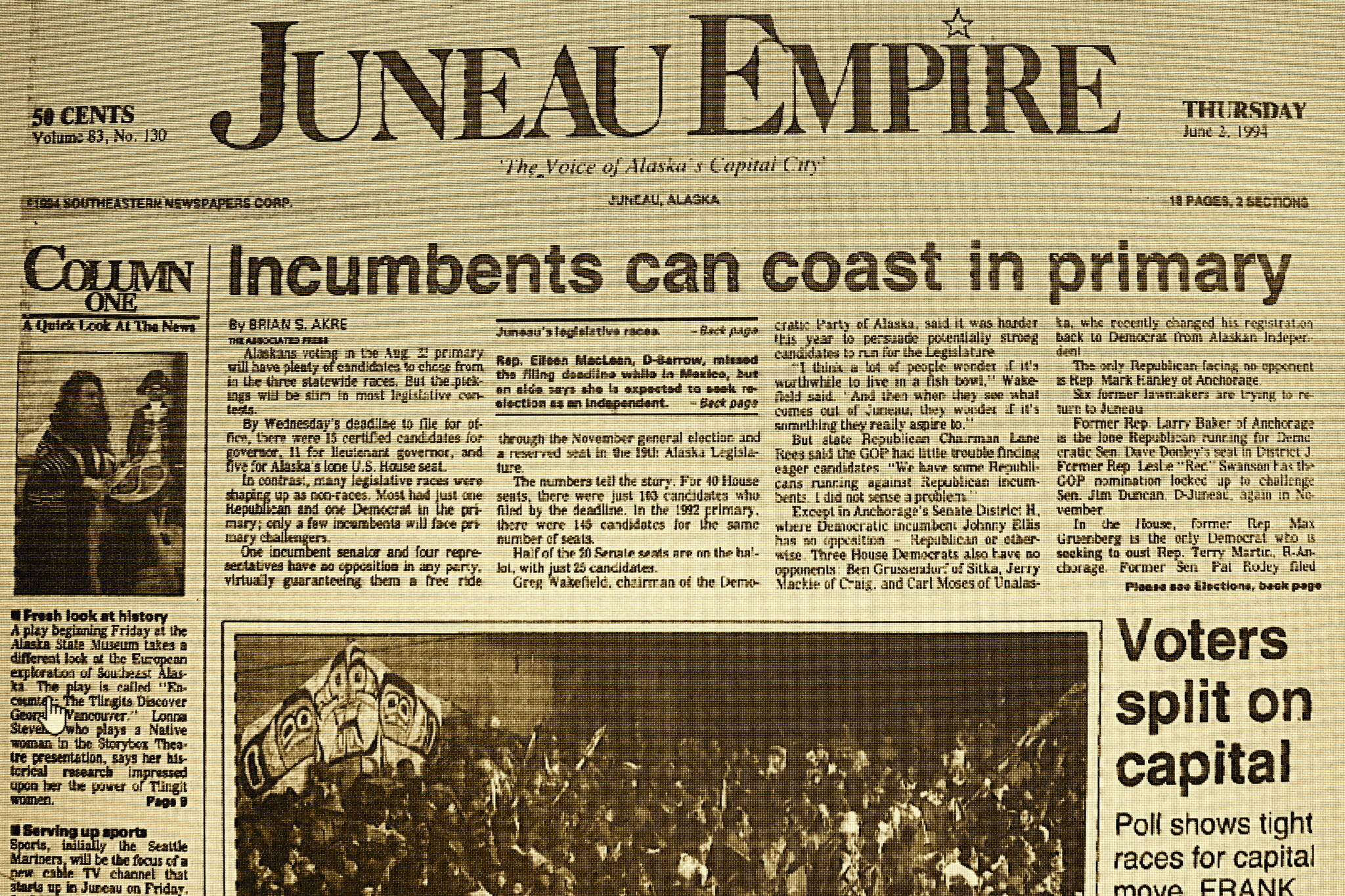Empire Archives is a series printed every Saturday featuring a short compilation of headline stories in the Juneau Empire from archived editions in 1984, 1994 and 2004.
This week in 1984, the Juneau School Board trimmed nearly $670,000 from next year’s school budget at its most recent meeting. The move was an effort to balance the district’s $25.2 million spending plan. The cuts included $260,000 in staffing and $472,208 in benefits, equipment, supplies and contracted services. The cuts were made after the Juneau City-Borough only approved $6.2 million of the district’s original $6.9 million request in May and $63,000 was added for a half-time aide at Floyd Dryden Junior High School, paying 75% of the Juneau-Douglas High School auditorium manager’s salary (25% will be paid by fees to use the auditorium) and busing students in an elementary swimming program. The personnel cuts include $100,000 for two projected full-time JDHS teaching positions (two half-time home economics and business education teachers, a half-time librarian and another half-time instructor), $40,000 for a projected part-time middle school foreign language teacher, $40,000 for a projected computer operator, $50,000 for a special education staff member and $30,000 for a projected maintenance worker.
Today the Juneau Board of Education has passed an operating budget of about $67 million for next year that is nearly $10 million less than originally proposed, but is considering adding $5.2 million back due to an increase in per-student funding approved by the Alaska Legislature. However, Gov. Mike Dunleavy could veto some or all of the increase when he signs the budget later this month.
Original Story: “School board cuts new budget nearly $670,000,” by Kyoko Ikenoue. 6/6/1984.
This week in 1994, the FRANK Committee appears to have its work cut out for it. A statewide poll released by the Fiscally Responsible Alaskans Needing Knowledge Committee shows that the FRANK initiative, which would require voter approval of any capital move, would fail. The poll shows 50% oppose the initiative and 37% support it. The initiative and the capital move question will be on the Nov. 6 statewide ballot. The poll shows the capital move itself would be a close vote: 44.5% of voters surveyed would cast their votes in favor of moving the capital to Wasilla, while 49% would vote against the move. Pollsters found most people do not understand the FRANK initiative and, based on the results of a separate poll conducted by an Anchorage firm, favor the measure when it is explained to them.
Today the capital remains in Juneau with no serious efforts made in recent years to move it further north. However, various aspects of “capital creep” remain ongoing, including during the past week when the Alaska Permanent Fund Corporation’s Board of Trustees ignored a directive by the Alaska Legislature against the establishment of an office in Anchorage, with the board members who are based in Anchorage planning to transfer some positions from the Juneau APFC headquarters to the larger city.
Original Story: “Voters split on capital,” by Tim Huber. 6/2/1994.
This week in 2004, although one nurse is supposed to take care of only two patients at the critical care unit of Bartlett Regional Hospital, Rob Lewis and another nurse — Sandra Gillim — started their shift with five. Bartlett’s nursing shortage in critical care reflects the nation’s situation, though overall, the hospital’s shortage is less pronounced. According to a national survey released by the American Organization of Nurse Executives in 2002, the average registered nurse turnover rate is 21%. The average nurse vacancy rate was 10%, with the highest rates in critical care units, at 14.6%, and medical-surgical care, at 14.1%. “As baby boomers grow older, people are living longer and need more medical services,” said Sheryl Washburn, patient care administrator and nurse executive at Bartlett. “Thanks to the advances of technology and medical management, people who stay in the hospital are much sicker than they used to be. And there are fewer schools in nursing.” Bartlett has been aggressive in combating the nursing shortage and successful in keeping its nurse vacancy rate at 3%, Washburn said. About 30% of its 121 nurses have worked for Bartlett for more than five years.
Today Bartlett is dealing with a financial as well as staffing crisis, including hiring traveling nurses at a considerably higher cost than permanent positions due to a nationwide shortage lingering from the COVID-19 pandemic.
Original Story: “Bartlett weathers nursing shortage,” by Juneau Empire staff. 6/2/2004.
• Contact Mark Sabbatini at mark.sabbatini@juneauempire.com or (907) 957-2306.

